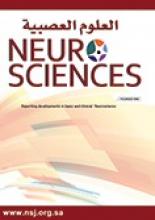Abstract
OBJECTIVE: To investigate whether lithium modifies open-field and elevated plus maze behavior, and brain phospho-glycogen synthase kinase 3 (P-GSK3beta) expression in Fmr1 knockout mice.
METHODS: One hundred and eighty FVB mice, including knockout and wild type, with an age of 30 days were used. An open-field and elevated plus maze was utilized to test behavior, while western blot was used to measure the P-GSK3beta expression. Six groups were formed: control (saline), lithium chloride 30, 60, 90, 120, and 200 mg/kg. The experiments were carried out in the Institute of Neuroscience, Second Affiliated Hospital of Guangzhou Medical University, Guangzhou, China between January and June 2012.
RESULTS: Lithium significantly decreased total distance, crossing, central area time, and center entry in the open-field test (p<0.05), and significantly reduced open-arm tracking, open-arm entry, and open-arm time in the elevated plus maze (p<0.05) in knockout mice. In wild type mice, significant changes were observed in both behavior tests in some treatment groups. Lithium ameliorated P-GSK3beta expression in the hippocampus of all the treatment groups in knockout mice (p<0.05). However, lithium did not modify either GSK3beta expression in tissues of knockout mice, or P-GSK3beta or GSK3beta expression in tissues of wild type mice.
CONCLUSION: Lithium ameliorated open-field and elevated plus maze behaviors of Fmr1 knockout mice. This effect may be related to its enhancement of P-GSK3beta expression. Our findings suggest that lithium might have a therapeutic effect in fragile X syndrome.
- Copyright: © Neurosciences
Neurosciences is an Open Access journal and articles published are distributed under the terms of the Creative Commons Attribution-NonCommercial License (CC BY-NC). Readers may copy, distribute, and display the work for non-commercial purposes with the proper citation of the original work.






